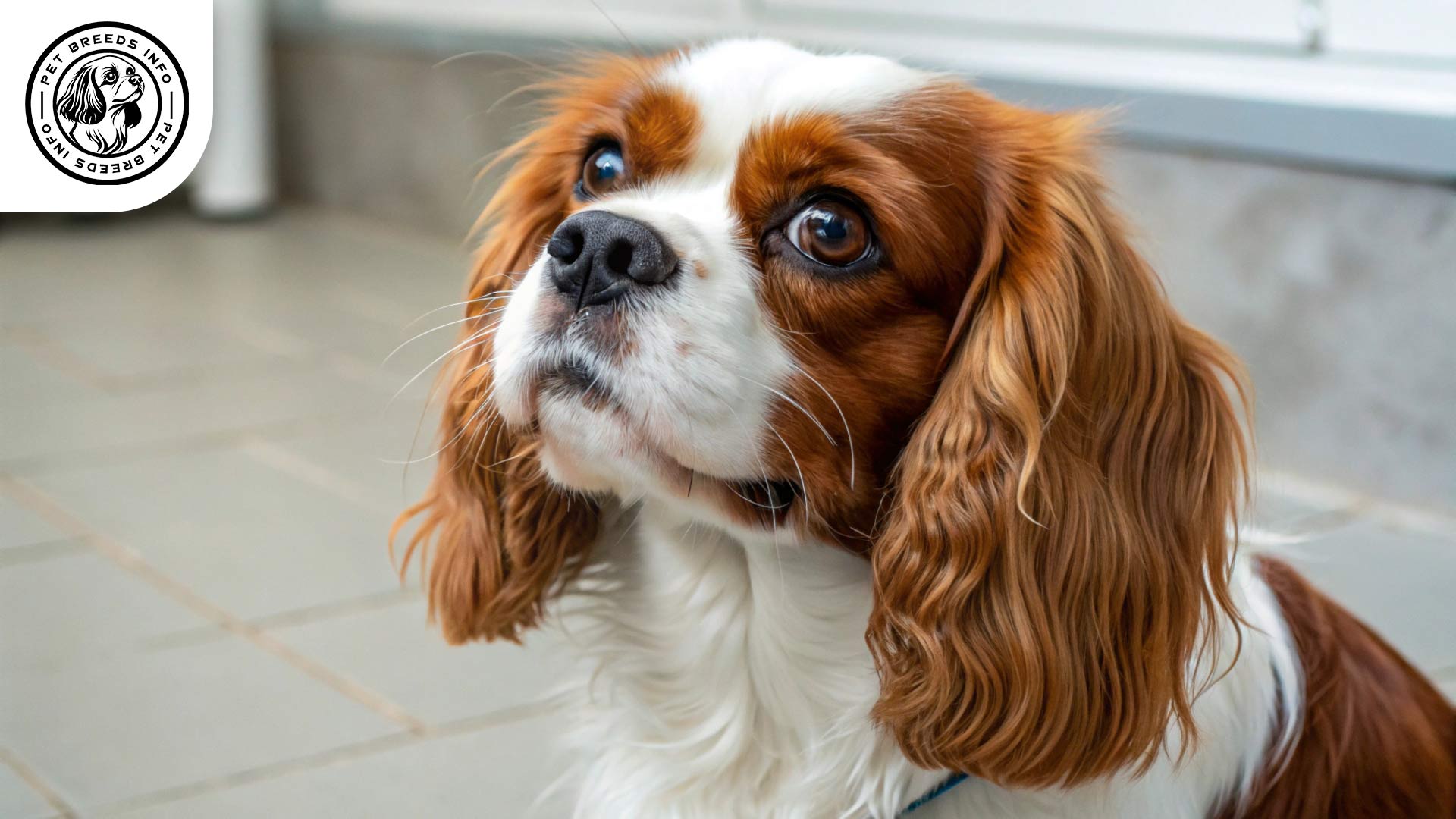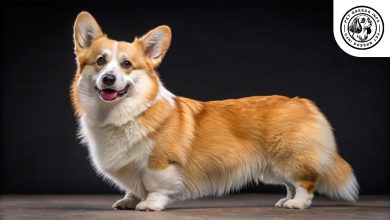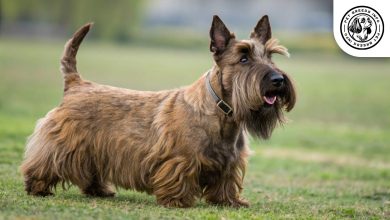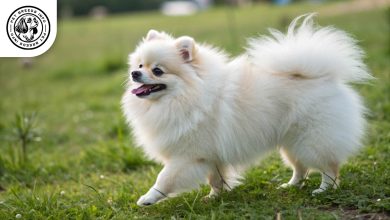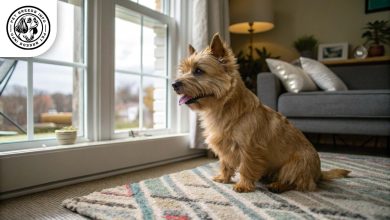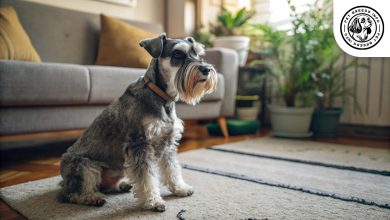Cavalier King Charles Spaniel Dog Breed: Size, Price & Personality
General Introduction of the Breed
The Cavalier King Charles Spaniel is a small, elegant toy breed originating from the United Kingdom. Also known simply as the “Cavalier,” this breed was named after King Charles II of England, who was known for his love of small spaniels.
The breed’s history dates back to the 17th century when small spaniels were popular among European nobility. Over time, breeders developed the modern Cavalier by crossing early spaniels with toy breeds to achieve a distinct look. The breed was officially recognized by the Kennel Club in 1945.
Table of Contents
| Color | Blenheim (chestnut and white), Tricolor (black, white, and tan), Ruby (solid red), Black & Tan |
| Weight | 13-18 pounds (6-8 kg) |
| Lifespan | 12-15 years |
| Diet | High-quality dry or wet dog food, portion control is essential, avoid harmful foods like chocolate, grapes, onions, and garlic |
| Care | Daily exercise, regular brushing, bathing, nail trimming, ear cleaning, dental care, protection from extreme weather |
| Health | Prone to genetic conditions like mitral valve disease (MVD), syringomyelia, hip dysplasia, and ear infections |
| Nature | Affectionate, friendly, intelligent, eager to please, social, good with children and other pets, sensitive to separation |
| Price | $1,500 – $3,500 (may vary depending on breeder and quality) |
Physical Characteristics
The Cavalier King Charles Spaniel is a small dog with a refined but sturdy structure. Males and females typically measure 12 to 13 inches (30-33 cm) in height and weigh between 13 to 18 pounds (6-8 kg).
The breed has a silky, medium-length coat that comes in four distinct color variations: Blenheim (chestnut and white), Tricolor (black, white, and tan), Ruby (solid red), and Black & Tan.
Their large, round, dark brown eyes give them a soft and expressive look. The ears are long, feathered, and set high on the head, framing the face beautifully. The tail is usually carried with elegance and can be left natural or slightly docked, depending on regional standards.
Read More: Cardigan Welsh Corgi Dog
Personality and Temperament
The Cavalier is known for its affectionate and friendly personality. They are highly intelligent and eager to please, making training relatively easy for most owners.
They have a moderate energy level and enjoy daily walks and play sessions, but they also love lounging with their owners. Cavaliers are extremely affectionate and thrive on human interaction, making them excellent companions.
They are social dogs that get along well with children, strangers, and other pets. While they were originally bred as companion dogs, they still retain some mild hunting instincts and enjoy chasing small animals.
Cavaliers are sensitive to changes in their environment and do not tolerate being left alone for long periods, as they can develop separation anxiety.
Care and Maintenance Requirements
Cavaliers need daily exercise, including walks and interactive play. They adapt well to both apartment living and homes with yards, but they prefer to be indoors with their families.
Their coat requires regular brushing to prevent tangles and matting, especially in feathered areas around the ears and legs. They are moderate shedders and benefit from weekly grooming.
This breed is sensitive to extreme weather conditions. They should be protected from excessive heat and cold exposure.
Hygiene care includes regular bathing, nail trimming, ear cleaning to prevent infections, and dental care to maintain oral health.
Read More: Chihuahua Dog
Diet and Nutrition
The ideal diet for Cavaliers includes high-quality dry or wet dog food, and some owners opt for a raw or homemade diet with veterinary guidance.
They are prone to obesity, so portion control is essential. Adults typically require two measured meals per day.
Avoid feeding them chocolate, grapes, onions, garlic, and excessive fatty foods, as these can be harmful.
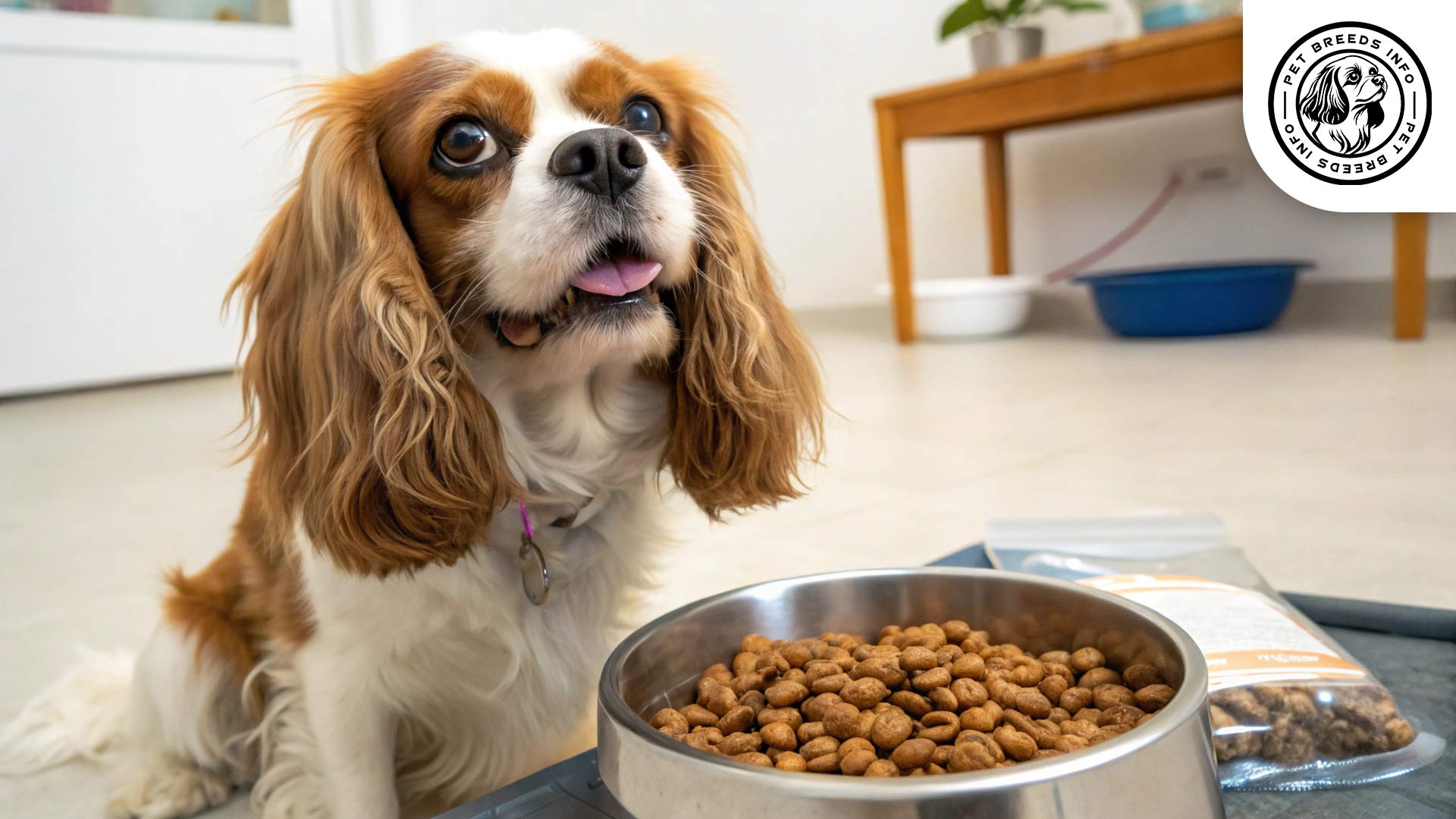
Health and Common Medical Issues
Cavaliers are prone to certain genetic conditions, including mitral valve disease (MVD), syringomyelia, hip dysplasia, and ear infections.
Their average lifespan is around 12 to 15 years, but regular veterinary check-ups can help manage potential health issues early.
Routine vaccinations, flea and tick prevention, and dental care are crucial for maintaining their health.
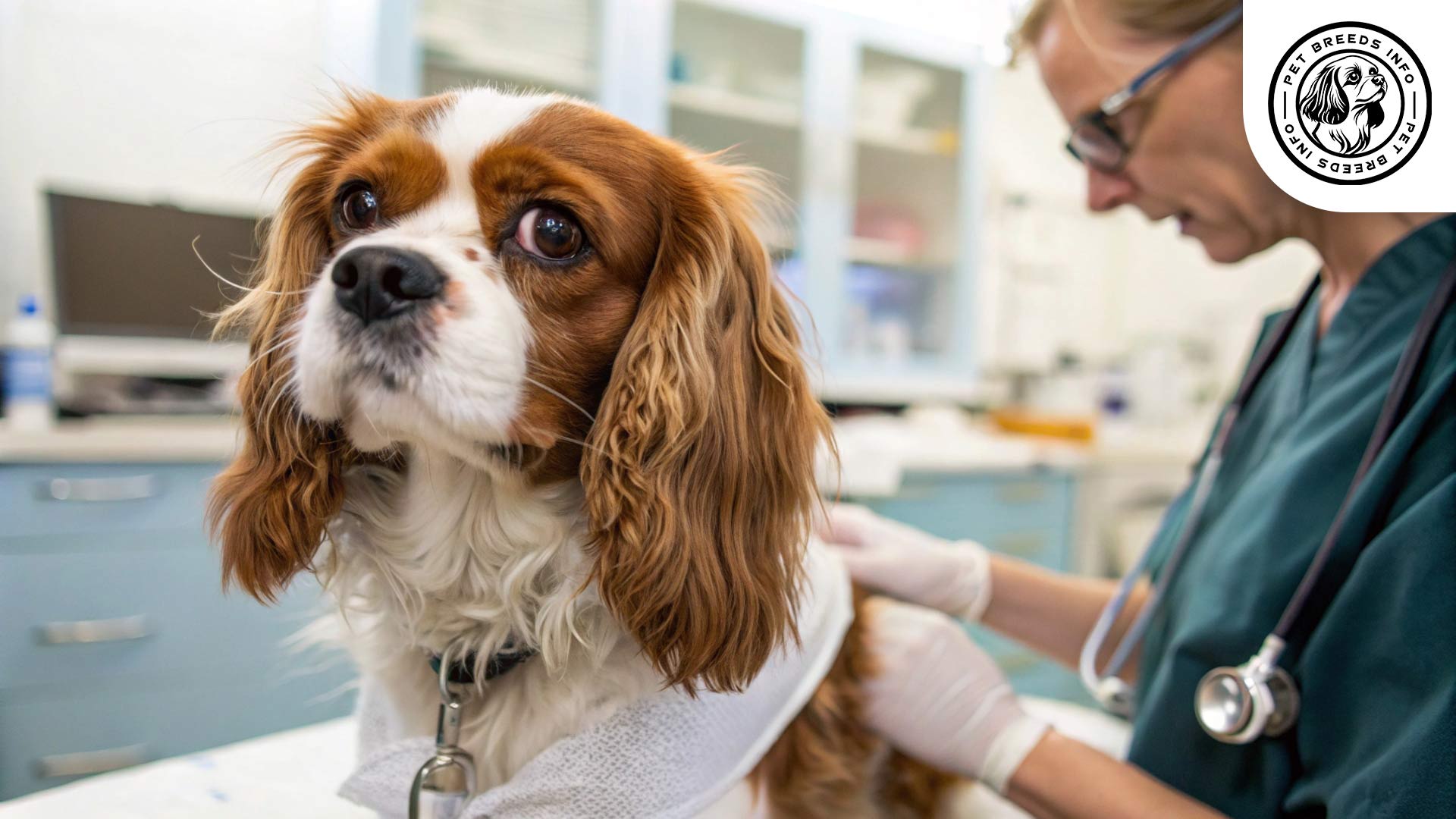
Training and Behavior Management
Cavaliers are intelligent and respond well to positive reinforcement training. They are eager to please and learn quickly, making them relatively easy to train.
Early socialization is crucial to help develop good behavior and confidence, especially since they can be shy around new people or environments.
Consistency and reward-based training help reinforce good manners. They do not respond well to harsh discipline, as they are sensitive to their owner’s tone and emotions.
Interaction with Other Animals and Humans
Cavaliers are excellent with children and make great family pets due to their gentle and playful nature.
They generally get along well with other dogs and pets, including cats, as long as they are properly introduced.
They thrive in homes where they receive plenty of social interaction and attention. They do not do well when left alone for long hours, as they are highly devoted to their owners.
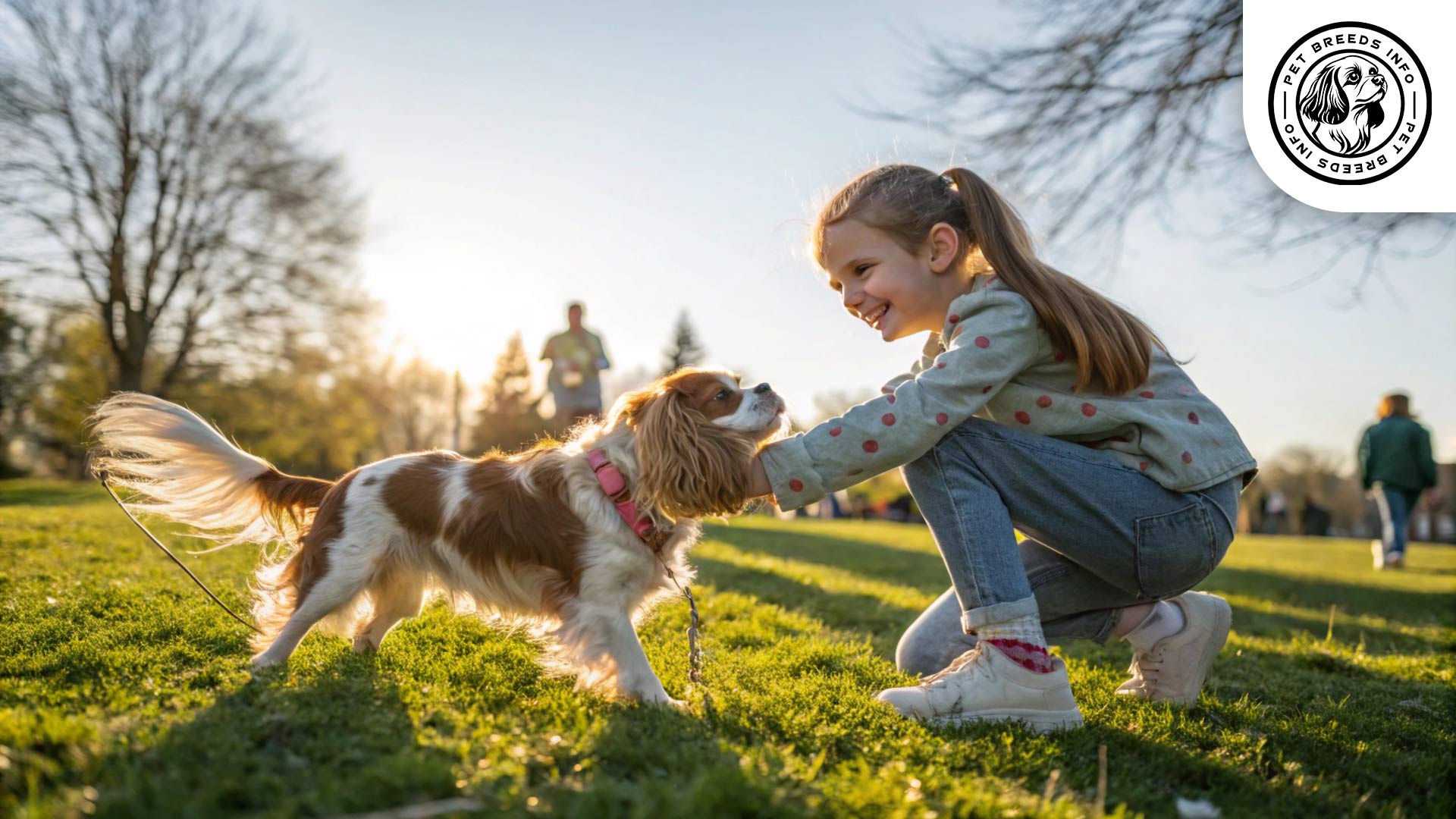
Price and Availability
The price of a Cavalier King Charles Spaniel varies but typically falls between $1,500 and $3,500 from a reputable breeder. Show-quality puppies may cost even more.
When purchasing or adopting a Cavalier, it’s important to choose a responsible breeder who performs health screenings. Adoption from shelters or Cavalier-specific rescues is also a great option.
Read More: Cane Corso Dog
Conclusion and Final Thoughts
The Cavalier King Charles Spaniel is a loving and affectionate breed that makes a great companion for families, seniors, and individuals alike. Their adaptable nature allows them to thrive in various living environments, from apartments to houses with yards.
They require moderate grooming, daily exercise, and plenty of attention from their owners. While they are prone to some health concerns, a well-cared-for Cavalier can live a long and happy life.
Before adopting this breed, prospective owners should consider their need for companionship and regular veterinary care. If you’re looking for a friendly, affectionate, and loyal dog, the Cavalier King Charles Spaniel might be the perfect breed for you.
FAQ
What is the average lifespan of a Cavalier King Charles Spaniel?
The average lifespan of a Cavalier King Charles Spaniel is around 12 to 15 years.
What are the common health issues of Cavalier King Charles Spaniels?
Cavalier King Charles Spaniels are prone to genetic conditions like mitral valve disease (MVD), syringomyelia, hip dysplasia, and ear infections.
How much exercise does a Cavalier King Charles Spaniel need?
Cavaliers need daily exercise, including walks and interactive play.
Are Cavalier King Charles Spaniels good with children and other pets?
Yes, Cavaliers are excellent with children and generally get along well with other dogs and pets, including cats, as long as they are properly introduced.
How much does a Cavalier King Charles Spaniel puppy typically cost?
The price of a Cavalier King Charles Spaniel puppy typically falls between $1,500 and $3,500 from a reputable breeder. Show-quality puppies may cost even more.
